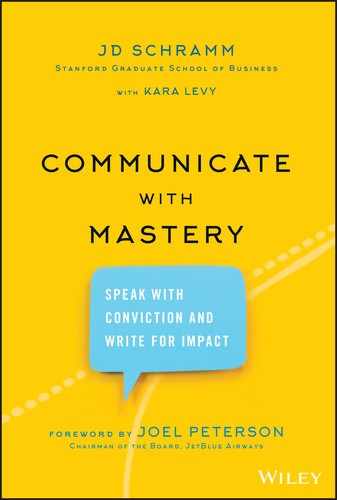APPENDIX C
MORE TIPS ON WINNING WRITING FROM GLENN KRAMON
These tips pick up from our conversation about writing earlier in the book. The whole document of Glenn's tips exists on my webpage. What follows are Glenn's words:
- RULE ONE: The first thing to ask yourself is: Who is my audience? I know you know this, but I'm struck by how many times we forget it. Think first: What result do I want from this writing, and how can I persuade the reader to help me achieve it? What is my ask?
- RULE TWO: Before you begin writing, it's so important to make sure you can answer this question: If you boiled it down to one phrase, sentence, or paragraph, what would it say? The shorter, the better. Put another way: Use the Miniskirt (or Speedo) Rule: Make it long enough to cover the basics, but short enough to keep it interesting.
- Use shorter, simpler words and sentences—help rather than assist or facilitate, use instead of utilize, start instead of commence, improve instead of try to make better. Pretend you're typing on your phone—it's so unpleasant to use those keyboards, you force yourself to say it in fewer words.
- “We are in the process of investigating.” Why not “We are investigating”? And “I am currently working for Google” is better as “I work at Google.”
- Use strong words. For example, why say “she is incredibly smart” when you can say “she's brilliant.” Why say something is “extremely important ” when you can say it's “crucial.” And “especially unusual ” is more powerful as “rare” or “extraordinary.” Indeed, remember that using too many adverbs is a sign of weak writing.
- Some examples where an adverb does NOT add value:
-
- I successfully got a scholarship
- I completely crushed it
- Tragically, the train derailed, killing 100.
- We're absolutely certain the election was rigged.
- The gender gap totally disappeared.
- Geeky men are socially awkward.
- Use shorter, simpler words and sentences—help rather than assist or facilitate, use instead of utilize, start instead of commence, improve instead of try to make better. Pretend you're typing on your phone—it's so unpleasant to use those keyboards, you force yourself to say it in fewer words.
- RULE THREE: Write it as you would say it to your colleague or friend. Avoid impersonal, abstract business jargon. Keep it simple.
- One trick: Say it to a friend and then write it as you said it. I'm surprised by how often a reporter can tell me a story better than she can write it. And once you've written it, read it aloud. Pretend you're delivering it to a friend or an audience. It will help you edit out unnecessary or unhelpful words. And it will help you sound less pretentious.
- Avoid business jargon: encourage instead of incentivize, affected instead of impacted, carry out instead of implement.
- Even worse is useless jargon, such as “I work in the ecommerce space” (what value does “space” add?). And “This was a crisis situation” (ditto for “situation”). And “we have an action plan” (what other kind of plan is there?).
- RULE FOUR: Get to the point quickly, not at the end. People grow impatient. Any of you appeared on TV? When the camera light comes on, you have about three seconds to win or lose your audience. As our students in the military have learned when talking to superiors: “B.L.U.F.—Bottom Line Up Front.” Say the most important things first.
..................Content has been hidden....................
You can't read the all page of ebook, please click here login for view all page.
